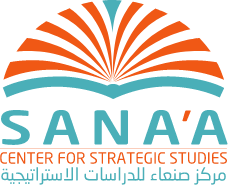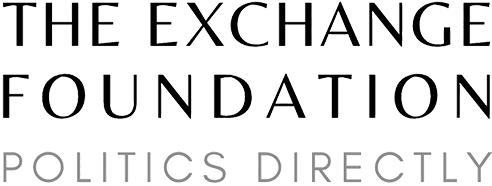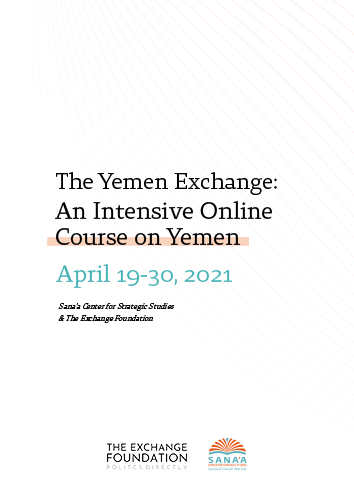April 19-30, 2021
The Seventh Yemen Exchange is an intensive online version of the Yemen Exchange organized by the Sana’a Center and The Exchange Foundation since 2017. The course is designed to provide unique access to information, perspectives, updates and analyses on Yemen for those seeking to develop a working background knowledge of the country as well as those already thoroughly versed in its dynamics.
The 10-day program will be conducted via Zoom Monday-Friday, starting at 16:00 Sana’a time/09:00 EST each day. Participants from around the world will attend sessions with Yemeni analysts, academics, politicians, bureaucrats, business leaders and international experts, gaining insight into the country from a wide range of perspectives. Participants will have the chance both to virtually engage with speakers during the sessions and to connect with them individually after the Exchange. The sessions – totaling more than 30 hours – will dive into several specific areas, including but not limited to: Yemen’s multifaceted conflicts; the country’s socio-political dynamics; internal divisions and alliances among parties to the conflict; the possibility of southern secession; military and political developments on the ground; the status of various armed groups; the regional battle for Yemen; the humanitarian and economic crisis in the country; the UN-led peace process; and impacts of the COVID-19 pandemic.
-
16:00 - 17:00 Sana’a / 09:00 - 10:00 ESTWelcome & introductionsIn this first optional session, participants will be welcomed by the organizers and have a chance to introduce themselves.Victoria SauerProgram manager of the Yemen Exchange.Nicholas NoeDirector of The Foundation for Global Political Exchange Inc.
-
17:15 - 18:30 Sana’a / 10:15 - 11:30 ESTYemen for beginnersThis session is designed to provide basic frameworks for understanding the country’s history as well as its current situation.Sana’a Center experts
-
16:00 - 17:00 Sana’a / 09:00 - 10:00 ESTIntroduction and course rulesFarea Al-MuslimiCo-founder and Chairman of the Sana’a Center; Associate Fellow at Chatham House.Osamah Al-RawhaniDeputy executive director of the Sana’a Center.
-
17:15 - 18:30 Sana’a / 10:15 - 11:30 ESTThe current fighting: who, where, why?Via maps and other visuals, this session will offer a deep dive into political alliances, divisions and conflicts in Yemen. Analysts will elaborate on current frontlines, armed groups and local and regional actors, other stakeholders, and the roots of the war.
The panel will be further refined based on the input and needs of accepted participants.Maged Al-MadhajiCo-founder and executive director of the Sana’a Center.Abdulghani Al-IryaniSenior researcher at the Sana’a Center.Ghaidaa Al-RashidyResearcher and visual data specialist at the Sana’a Center.
-
16:00 - 17:15 Sana’a / 09:00 - 10:15 ESTThe Houthi movement and Salafis from an academic perspectiveMaysaa Shujaa Al-DeenNon-resident fellow at the Sana’a Center, where her research focuses on religious sectarianism, political transformation and Yemen’s geopolitical role in the region.Laurent BonnefoyResearch fellow at the French National Center for Scientific Research (CNRS) and author of Salafism in Yemen: Transnationalism and Religious Identity, (London: Hurst, 2011).Luca NevolaMiddle East senior researcher at ACLED and postdoctoral research associate at the University of Sussex. Between 2009 and 2013, Nevola conducted ethnographic fieldwork in Yemen.Emanuel SchaeublinAnthropologist for the Mediation Support Team at the Center for Security Studies (ETH Zurich) and member of the Sana’a Center Geneva Association.Facilitator
-
17:30 - 18:45 Sana’a / 10:30 - 11:45 ESTArmed groupsUsing maps and other visuals, this session will cover the status and activities of non-state armed groups currently active in Yemen’s civil war, including AQAP and IS, and their role in post-war Yemen, as well as foreign counterterrorism operations inside Yemen.Elisabeth KendallSenior research fellow in Arabic and Islamic studies at Pembroke College, Oxford University, with significant field work experience in Yemen.Peter SalisburySenior Yemen analyst at International Crisis Group and a former journalist.Mohammed Al-BashaCommunications and client engagement manager and Yemen expert at the Navanti Group, and former spokesman for the Embassy of Yemen in Washington, D.C.Sama’a Al-HamdaniDirector of the Yemen Cultural Institute for Heritage & the Arts, former non-resident fellow at the Middle East Institute and Georgetown University.Facilitator
-
16:00 - 17:15 Sana’a / 09:00 - 10:15 ESTStatus of the economy and the Yemeni rialSana’a Center economists
-
17:30 - 18:45 Sana’a / 10:30 - 11:45 ESTWar and the private sectorThis session will examine current and post-war challenges facing Yemen’s economy, analyze how this war is essentially an economic struggle, and introduce possible economic frameworks for post-war Yemen.Mazen AmanAdvisor to HSA Yemen Managing Director, Economic Reform Team member and Development Champions Forum member.Najat JumanHead of the businesswomen sector at the Yemen Chamber of Commerce, pro-fessor of Finance at Sana’a University, and a member of the NDC.Omar Al-AqelExpert on Yemen’s economy and devel-opment issues.Rafat Al-AkhaliFormer Yemeni Minister of Youth and Sports and Co-founder of DeepRoot Consulting.Facilitator
-
16:00 - 17:15 Sana’a / 09:00 - 10:15 ESTThe role of tribal women in mediating conflictNajwa AdraSenior researcher at the Institute for Social Anthropology at the Austrian Academy of Sciences, focusing on tribes in Yemen.Ahmed Al-AramiNon-Resident Fellow at the Sana’a Center, focusing on social, political and cultural developments in Yemen, as well as relations between Islamist groups and Yemeni tribes.Rim MugahedSana’a Center Researcher and Project Manager, focusing on Yemeni tribes and political parties.Facilitator
-
17:30 - 18:45 Sana’a / 10:30 - 11:45 ESTYemen’s water and natural resourcesIsmail Al-JanadFormer Chairman of Yemen’s Public Authority for Geological Survey and Mineral Wealth.Helen LacknerResearch Associate at SOAS University of London and visiting fellow at the European Council for Foreign Relations.Juliane SchillingerPhD candidate at the University of Twente in the Netherlands. Her research focuses on the impacts of armed conflict on local water management in the Middle East.Facilitator
-
16:00 - 17:15 Sana’a / 09:00 - 10:15 ESTThe government perspectiveMaeen Abdel Malek SaeedPrime minister of Yemen.Maged Al-MadhajiCo-founder and Executive Director of the Sana’a Center.Facilitator
-
17:30 - 18:45 Sana’a / 10:30 - 11:45 ESTYemen at the UN Security CouncilGregory JohnsenNon-Resident Fellow at the Sana’a Center, focusing on armed groups in Yemen; former member of the Panel of Experts of the UN Security Council on Yemen.Benjamin VillantiPolicy Analyst at Security Council Report covering a variety of countries and issues, including Yemen.Dr. Hamid Al-AwadhiFormer Yemeni deputy minister of foreign affairs.Jamila Ali RajaaChair of the Sana’a Center advisory board. She is a former Yemeni diplomat and a senior analyst, lecturer and policy consultant, including for the UN and several European foreign agencies.Facilitator
-
19:00 - 20:00 Sana’a / 12:00 - 13:00 ESTYemen's art world: The past, present, and futureDr. Amnah Al-NasiriPhilosophy and Aesthetics Professor at Sana’a University and a painter.Alia AliYemeni-Bosnian-American multimedia artist and activist.Mazen Al-SaqqafYouTube content creator and a social media influencer.Facilitator
-
15:00 - 16:00 Sana’a / 08:00 - 09:00 ESTLessons from Somaliland for international peace-building in YemenSarah PhillipsNon-Resident Fellow and Director of the Research Training and Academic Mentoring program at the Sana’a Center.Ryan BaileyEditor and Researcher at the Sana’a Center.Facilitator
-
16:15 - 17:30 Sana’a / 09:15 - 10:30 ESTThe regional fight for YemenThis panel will analyze the role of key regional actors with a stake in the geopolitical fight for Yemen, examining the policies and interests of Iran, Saudi Arabia, the UAE, Oman and Qatar.Thomas JuneauNon-Resident Fellow at the Sana’a Center; Assistant Professor at the Graduate School of Public and International Affairs, University of Ottawa, focusing on Iran and Yemen.Mustapha NomanFormer Yemeni diplomat and former Deputy Minister of Foreign Affairs of Yemen.Amat Al Alim AlsoswaFormer Yemeni Minister for Human Rights; Ambassador to the Netherlands, Sweden and Denmark, UN assistant secretary-general, UNDP assistant administrator and director of UNDP’s Regional Bureau for Arab States.Facilitator
-
17:45 - 19:00 Sana’a / 10:45 - 12:00 ESTYemeni diasporaSolenn Al-MajaliNon-Resident Fellow at the Sana’a Center, focusing on the Yemeni diaspora.Qabool AlabsiDirector of Qarar Foundation for Media and Sustainable Development and a researcher focusing on the Yemeni diaspora in Egypt.Nadim HouryExecutive Director of the Arab Reform Initiative (ARI).Facilitator
-
16:00 - 17:15 Sana’a / 09:00 - 10:15 ESTZoom into the south: Shabwa, Aden and HadramawtAmmar Al-AulaqiYemeni government official and polit-ical analyst.Hussam RadmanResearcher and Director of the Sana’a Center Aden office. He focuses on southern politics and armed groups.TBDGhaidaa Al-RashidyResearcher and Visual Data Specialist at the Sana’a Center.Facilitator
-
17:30 - 18:45 Sana’a / 10:30 - 11:45 ESTLocal and tribal politics in Al-Mahra and SocotraAhmed NagiNon-Resident Scholar at the Carnegie Middle East Center.Casey CoombsResearcher at the Sana’a Center; he was based in Yemen between 2012 and 2015.Facilitator
-
16:00 - 17:15 Sana’a / 09:00 - 10:15 ESTMinorities and marginalized communities in YemenYemeni researchersYasmeen al-EryaniDirector of Research at the Sana’a Center and a PhD candidate in social anthropology.Facilitator
-
17:30 - 18:45 Sana’a / 10:30 - 11:45 ESTThe current state of Yemen’s tribesSheikh Hussein Al-AwadhiTribal sheikh and former governor of Al-Jawf.Bilqees Al-LahbiResearcher at the Sana’a Center, focusing on political and social developments in Yemen.Nadwa Al-DawsriConflict analyst and non-resident scholar at Middle East Institute, focusing on Yemen’s tribes.Facilitator
-
16:00 - 17:15 Sana’a / 09:00 - 10:15 ESTYemen’s civil societyAyoob Al-QasmiCo-founder and Director of Improve Your Society Organization in Taiz.Shroq AlramadiSocial and cultural entrepreneur; Founder of Takween Cultural Club and Researcher at Yemen Polling Center.Awfa Al-NamiSaferworld Yemen country representative.Aisha JamalProgram Manager at the Sana’a Center of the Yemen Peace Forum initiative.Facilitator
-
17:30 - 18:45 Sana’a / 10:30 - 11:45 ESTRole of the International CommunityHans GrundbergEU Ambassador to Yemen.Michael AronUK Ambassador to Yemen.Shams ShamsanResearcher at the Sana’a Center and Graduate Student in Global Political Economy at Glasgow University.Facilitator
-
16:00 - 17:00 Sana’a / 09:00 - 10:00 ESTDevelopments on the Red Sea frontlineHamed GhalebOffice Director of General Tareq Saleh.Maged Al-MadhajiCo-founder and Executive Director of the Sana’a Center.Facilitator
-
17:15 - 18:15 Sana’a / 10:15 - 11:15 ESTThe UN peace processGriffiths MartinSpecial Envoy of the UN Secretary-General for Yemen.Osamah Al-RawhaniDeputy Executive Director of the Sana’a Center.Facilitator
-
18:15 - 19:00 Sana’a / 11:15 - 12:00 ESTEvaluation and Q&ASana’a Center for Strategic Studies
All costs related to the Yemen Exchange are funded by participant fees. There is no supplementary government or private-sector support, a fact that allows us to assure participants of a relatively neutral platform for the free exchange of information and open dialogue.
All sessions are held under the Chatham House Rule (and are therefore not recorded). Some sessions host only one speaker in order to assure as open and unfiltered a discussion as possible on very sensitive topics. Simultaneous translation to English will be provided in the case of non-English presentations.
Prior to the beginning of the course, accepted participants will receive a course reading list and final agenda. Throughout the ten days of the course, necessary agenda updates will be communicated with participants. Those interested will also be connected with the speakers, enabling them to follow up with these experts for their own work and research.
Applying for a scholarship: The Yemen Exchange currently has five scholar-ships (covering the participation fee) available for researchers who will deepen the social, political and geographic diversity of the Exchange and who can demonstrate both financial need and a deep interest in Yemen. For any questions related to scholarships or to request an application with more information, email: [email protected].



